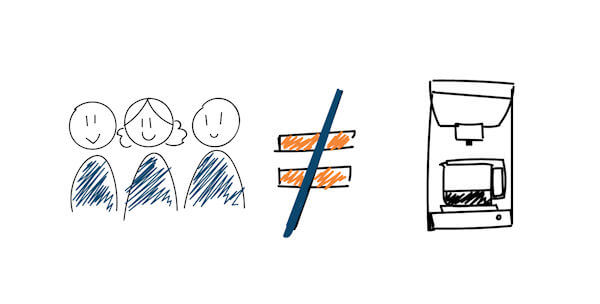Many companies still use the term “resources” to describe employees. There are “Human Resources” departments and “resource allocation for projects.” Sometimes managers forget that a human is not a printer, server, or coffee maker. They then adapt their management style by treating employees as office equipment, giving them instructions and moving them around like furniture. This approach has a strong impact on both the well-being of the employees and the functioning of the entire company. The mechanics of work cannot be separated from the psychological and social aspects. In other words, you can’t hire only hands and skip the rest. You have to employ the whole person. How we approach working with others has a huge impact on the way we manage. For this reason, I have collected five main differences between people and resources that every manager should know about before being allowed to work with any team.
1. Human interactions are complex.
It takes a few minutes to unplug the coffee machine and install a new one. It takes months to replace a member of the team. Every human being has their own set of beliefs and values. These affect their lifestyle, who they like to work with and who they don’t. Relations within the group determine its effectiveness. Therefore, it takes time to build connections and create an effective team. It is not a matter of several days or one integration trip, but months or even years of facing challenges together. This, in turn, leads to how team members go through the conflicts and how they develop methods to solve them. Therefore, do not “optimize” teams by exchanging their members. Build stable teams because they are much more efficient. Changing even one person will affect the entire team, which will then be forced to go through the group process yet again. That’s why it’s also a good idea to let employees decide who they want to work with on their team.
2. People can learn.
No matter how much time you spend with your printer, you won’t learn how to make coffee. It is different for people. We are not born as C++ programmers, testers, or salesmen. Mastering new technology or acquiring business knowledge is a matter of time. Mentoring or training is often a better option than adding more people to the team (see point above). It also means that the work environment must allow for continuous development of the employee’s skills and make use of their talents.
3. People are creative.
Although espresso helps in solving problems, my coffee machine does not come to me with suggestions for changing the way of working. Employees, however, are the basis for continuous improvement. Ideas for process and product advancements should come from them. If your organization does not take advantage of these, you will lose the best source to better your processes, products, and company. In the end, you’ll gain frustrated employees who, feeling ignored, will leave or stop being involved.
4. People have needs.
You can force the coffee maker to make coffee. You can even request it to make one espresso after another without explaining why. It won’t be offended if you yell at it at the same time (and it may even start working better). However, you can’t force people to do their jobs with enthusiasm. They have free will, and without internal motivation, they will not be of great benefit to a company. Safety, honesty, relationships, autonomy, and development are necessary for everyone to do their jobs effectively. You won’t address these needs with a higher salary or foosball table. People won’t get involved in repetitive, monotonous work for which they do not see the results. They must understand the meaning and see the impact of their actions.
5. People want to be proud of what they do.
Poor-quality grains don’t cause the coffee machine to feel depressed. Calling people resources is dehumanizing and deprives employees of the joy of their work. What you need is an environment where people feel responsible for their work. Committed employees come to the office not to sit for eight hours, but to create amazing products. Each of us wants to thrive and be able to proudly tell our family and friends what we do and how our work changes the world.
Prohibit the word “Resources”
As you can see, using the word “resources” is just bad for both employees and the whole company. In my opinion, it should be banned. So what to use instead of “resources”? Let’s address the book by its cover – “people” and “employees” are the best names for each person in your organization.

